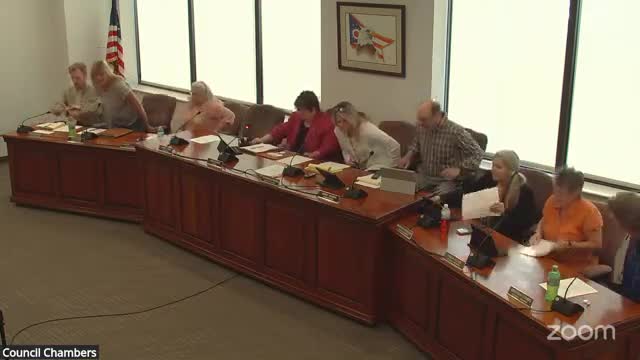Talbert House worker urges stronger service linkages as South Lebanon and Warren County see growing homelessness
October 03, 2025 | South Lebanon City Council , South Lebanon, Warren County, Ohio
This article was created by AI summarizing key points discussed. AI makes mistakes, so for full details and context, please refer to the video of the full meeting. Please report any errors so we can fix them. Report an error »

Savannah Cook, a social worker with Talbert House, told the South Lebanon City Council on Oct. 2 that Warren County has very limited shelter capacity and that gaps in post-shelter service connections are feeding a cycle of repeated homelessness.
Cook said Warren County effectively has one single adult shelter with 12 beds in South Lebanon and a second program for families, Family Promise in Lebanon, which she said is “full majority of the time.” She said Family Promise has helped 28 families so far this year.
The shortage of beds is compounded, Cook said, because many people experiencing homelessness have untreated mental-health conditions or substance-use disorders. “They’re not connecting with services,” Cook said. “We’re not hitting the root problem here.” She described a model of community care coordinators who work with law-enforcement partners to de-escalate crises and connect people to treatment and permanent supportive housing.
Cook outlined local resources she said are available to first responders and the public: a community care coordinator affiliated with Talbert House who can be contacted through Joshua’s Place or the sheriff’s office; a Hope Line specialist for substance-use incidents who will respond with a trained officer; and crisis-intervention training for officers. She said about 10 Warren County sheriff’s deputies have completed the training, and other departments in the region have sent small numbers of officers.
Cook also described a new residential crisis facility being developed on Kingsview Drive that she said will have 16 beds. Talbert House will run the facility, she said, and Warren and Hamilton county mental-health boards will fund the program. Cook said the site will accept people in active crisis who do not meet criteria for hospital admission and that a case manager at the facility will work to connect residents to ongoing services, including Greater Cincinnati Behavioral Health, Butler Behavioral Health or others.
Council members asked for printed materials; Cook said she had pamphlets and a resource spreadsheet and could leave them with City Hall staff.
Why it matters: Council members said the city and its first responders face clients who need coordination among service providers, law enforcement and county boards. Cook’s presentation identified specific local resources and an upcoming facility the council and public may encounter in planning and public-safety work.
Cook closed by urging coordination to prevent people from cycling through jail and back onto the street: “It’s a way to kind of eliminate the homeless population, but also prevent them from reentering the population as a homeless individual,” she said.
Cook offered contact materials to City Hall staff for distribution.
Cook said Warren County effectively has one single adult shelter with 12 beds in South Lebanon and a second program for families, Family Promise in Lebanon, which she said is “full majority of the time.” She said Family Promise has helped 28 families so far this year.
The shortage of beds is compounded, Cook said, because many people experiencing homelessness have untreated mental-health conditions or substance-use disorders. “They’re not connecting with services,” Cook said. “We’re not hitting the root problem here.” She described a model of community care coordinators who work with law-enforcement partners to de-escalate crises and connect people to treatment and permanent supportive housing.
Cook outlined local resources she said are available to first responders and the public: a community care coordinator affiliated with Talbert House who can be contacted through Joshua’s Place or the sheriff’s office; a Hope Line specialist for substance-use incidents who will respond with a trained officer; and crisis-intervention training for officers. She said about 10 Warren County sheriff’s deputies have completed the training, and other departments in the region have sent small numbers of officers.
Cook also described a new residential crisis facility being developed on Kingsview Drive that she said will have 16 beds. Talbert House will run the facility, she said, and Warren and Hamilton county mental-health boards will fund the program. Cook said the site will accept people in active crisis who do not meet criteria for hospital admission and that a case manager at the facility will work to connect residents to ongoing services, including Greater Cincinnati Behavioral Health, Butler Behavioral Health or others.
Council members asked for printed materials; Cook said she had pamphlets and a resource spreadsheet and could leave them with City Hall staff.
Why it matters: Council members said the city and its first responders face clients who need coordination among service providers, law enforcement and county boards. Cook’s presentation identified specific local resources and an upcoming facility the council and public may encounter in planning and public-safety work.
Cook closed by urging coordination to prevent people from cycling through jail and back onto the street: “It’s a way to kind of eliminate the homeless population, but also prevent them from reentering the population as a homeless individual,” she said.
Cook offered contact materials to City Hall staff for distribution.
View full meeting
This article is based on a recent meeting—watch the full video and explore the complete transcript for deeper insights into the discussion.
View full meeting
